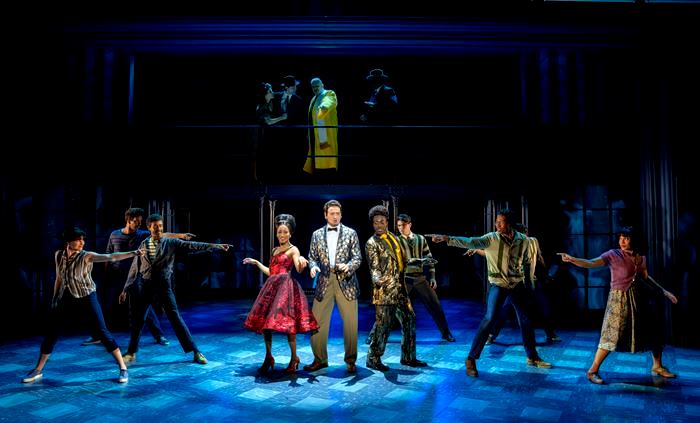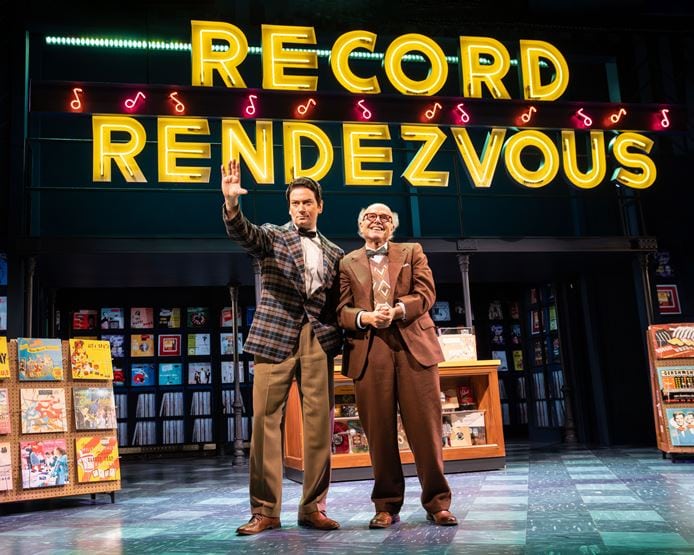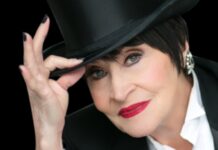The latest jukebox bio-musical to hit the NYC stage, Rock & Roll Man by Gary Kupper, Larry Marshak, and Rose Caiola, now playing a limited Off-Broadway run at New World Stages, considers the boundary-breaking legacy and troubled times of DJ Alan Freed (1921-65) in the context of a wild fever dream on the last day of his short life (he died at the age of 43, from alcoholic cirrhosis and uremia). Filled with exuberant fast-paced segments of early rock-and-roll classics, the high-energy show is sure to delight lovers of the genre with its spot-on retro-stylings and entertaining characterizations of familiar figures of the era by a blockbuster cast, directed by Randal Myler and led by Constantine Maroulis in the title role of the controversial Freed.

Bombarded with memories of the pivotal role he played in breaking down mainstream barriers in popular mid-century music by promoting Black rhythm-and-blues artists to racially mixed audiences of excited fans in record stores, on the radio, in live concerts, and on TV, Freed also reimagines the backlash he faced for his dedication to desegregating American music and for his often-illegal business tactics in the framing device of his hallucinatory vision of being tried in the court of public opinion, with FBI Director J. Edgar Hoover (an appropriately gruff and curmudgeonly Bob Ari) serving as prosecutor and Little Richard (in a sidesplitting impersonation by Rodrick Covington) as his defense attorney – “Shut up!” His Dairy Queen scene is over-the-top hilarious, in the best Little Richard style.
It’s all a wacky mix of camp humor with an eye on the mind-set of the period, driven by transporting performances of chart-topping hits by such rock-and-roll icons as Little Richard, LaVern Baker (played by Valisia LeKae), Chuck Berry, Screamin’ Jay Hawkins (both portrayed by Matthew S. Morgan), Frankie Lymon (Jamonté), Bo Diddley (Eric B Turner), Buddy Holly (Andy Christopher), Jerry Lee Lewis (Dominque Scott), The Chords, The Drifters, and The Platters, with vintage rock-and-roll elements developed by Marshak Classic Music LLC and Gary Kupper Music, top-notch musical direction by Dave Keyes, music supervision and arrangements by Kupper and Keyes, additional orchestrations and dance arrangements by Kenny Seymour, and John Miller serving as music coordinator.

The stellar vocals and smooth group harmonies, all brilliantly delivered by the outstanding cast of triple-threats (rounding out the ensemble are Natalie Kaye Clater, Lawrence Dandridge, AJ Davis, Chase Peacock, and Bronwyn Tarboton) and backed by a live five-piece orchestra (George Naha on guitars, Lee Nadel on bass, Rocky Bryant on percussion, Mark Ivan Gross, Sr. on reeds, and conductor Keyes on synth), are enhanced by lively period-style choreography by Stephanie Klemons, performed on stage by both the singers and the young generation of fans bopping to their songs, in a dazzling array of mid-century and character-defining costumes by Leon Dobkowski and hair, wigs, and make-up by Kelley Jordan.
The enthusiastic real-life audience on the date I attended (and, I imagine, at every performance) was also clapping, singing along, and moving to the lively beat of the music, which included authentic versions of “Sh-Boom,” “Jim Dandy,” “Lucille,” Maybelline,” a medley of “Good Golly/Tutti Frutti,” “Peggy Sue,” “Yakety Yak,” “Great Balls of Fire,” “Why Do Fools Fall in Love,” and more favorites from the ‘50s that brought down the house and had everyone smiling – exactly what a nostalgic jukebox musical is intended to do.

Along with the well-known rock-and-roll standards, Maroulis’s impressive vocal skills are highlighted in some new original songs by Kupper, and his solid acting chops are displayed in the narrative elements of the show. They trace Freed’s journey from Cleveland, where the DJ-on-the-rise teams up with the affable and joking record-store owner Leo Mintz, a simpatico aficionado and supporter of contemporary Black music, to NYC, where he becomes a top radio personality and concert producer, and forms an ill-advised business relationship with Morris Levy, who ran a record company, owned Birdland Jazz Club, and had ties to the mob (Joe Pantoliano doubles as Freed’s consecutive partners and clearly distinguishes between the antithetical personalities of the two men). The changing locales and dream sequences are effectively established in an eye-catching and evocative bi-level scenic design by Tim Mackabee, projections by Christopher Ash, colorful lighting by Matthew Richards and Aja M. Jackson, and sound by Ed Chapman.

By the end of the story, with Freed’s decline into payola schemes, crediting himself as co-writer of songs that he didn’t write to get a percentage of the royalties, tax evasion (resulting in investigations and court cases), alcohol abuse, and neglect of his family (with his mother, wives, and daughter played by Autumn Guzzardi and Anna Hertel), the mood can become a bit maudlin at times. There’s also a questionable earlier scene in which Freed, after listening to the lyrics of “Sixty Minute Man” (“I rock ’em, roll ’em all night long”), supposedly coined the term “rock-and-roll” (though, in fact, the name was not invented by him but was actually in use several years before he popularized it, so I guess we can attribute that to his fever-dream fantasy).
But Alan Freed was responsible for spreading the joy of rock-and-roll, bringing its Black and white artists together on stage for the first time in history, and for integrating audiences around the country through their shared love of the music. And in 1986, Freed was inducted into the Rock and Roll Hall of Fame in Cleveland, the city where he got his start, and was honored with a star on the Hollywood Walk of Fame in 1991. The current musical is another significant, and engaging, recognition of his invaluable contributions to the history of rock-and-roll.
Running Time: Approximately two hours and 10 minutes, including an intermission.
Rock & Roll Man plays through Friday, September 1, 2023, at New World Stages, Stage 3, 340 West 50th Street, NYC. For tickets (priced at $70-174, plus fees), call (212) 239-6200, or go online. Masks are no longer required but are recommended.






Due to popular demand, Rock & Roll Man has been extended from its original closing date of September 3, with a new block of tickets now available through Sunday, November 5.
It was just announced that Rock & Roll Man will close on Friday, September 1, in advance of its national tour.